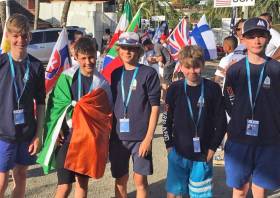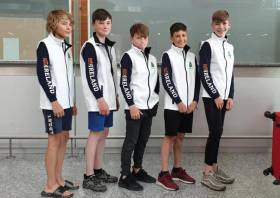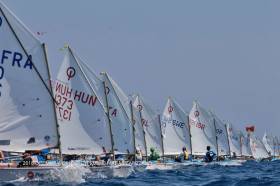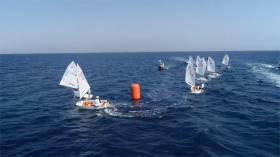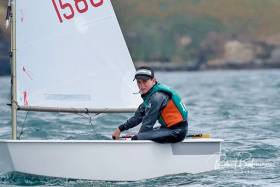Displaying items by tag: Optimist Worlds
The 2023 Optimist World Championships from 16-24 June were and extra-special occasion this year as IODA is celebrating its 50th year, writes Fionnuala Start.
The location in L’Escala on the Costa Brava in Spain was ideal with sunny weather throughout most of the 10 days. All teams stayed in Camping La Bellena and launched from the beach there, making transit to the launching area seamless.
Launching directly from the beach went well for the first few days of sailing. However, heavy swell precluded launching for a couple of days in the middle of the competition, though it was good for surfing! Racing ended on the last day with three races and a total of nine races were completed.
Jules Start (Royal St George YC) was first Irish boat, followed closely by clubmate Caoilinn Geraghty McDonnell; both qualified for the Bronze fleet. Gemma Brady (National YC), Harry Dunne (Howth YC) and Andrew O’Neill (Royal Cork/RSGYC) competed in the Emerald fleet.
Jules Start was ranked number-one IODAI sailor for 2022-23 and was awarded best Irish sailor in the 2022 Optimist European Championships, competing in the Silver fleet. Caoilinn Geraghty McDonnell was awarded best Irish sailor in 2022 Optimist Worlds, coming 65th in the Gold fleet.
Overall Sweden took first place, followed by USA in second and third, with Italy a close fourth and fifth. See the full results HERE.
As part of the IODA 50th celebrations, the competitors were treated to an in-person visit from Marco Gradoni, three-time Optimist World Champion who shared his gems of wisdom with the young sailors.
Overall it was a fantastic event and one to remember by our sailors.
Howth’s Rocco Wright Makes Top 10 At Optimist Worlds
Howth Yacht Club’s Rocco Wright scored a tremendous result for Ireland as he placed 10th in the Optimist Worlds in Antigua earlier this week.
He was followed closely in the final standings by 13th-placed James Dwyer Matthews of the Royal Cork/Kinsale in the event won by the new three-time champion Marco Gradoni of Italy.
The rest of the Irish team are also to be commended for their finishes in a field comprising 255 young sailors: Sam Ledoux (National YC) was 70th overall, Luke Turkey (HYC) 100th and Ben O’Shaughnessy (RCYC) 159th.
In the glow of that achievement for the nation, the International Optimist Dinghy Association of Ireland (IODAI) has decamped to Waterford Harbour for the Optimist Munster Championships from today, Saturday 29 July.
The event is open to all boats of the IODAI across Regatta, Junior and Senior fleets, with the Notice of Race, Sailing Instructions and Supplementary Instructions available on the Waterford Harbour Sailing Club website.
The International Optimist Dinghy Association Ireland (IODAI) shared a photo yesterday (Sunday 30 June) of the five-strong team headed to Antigua to represent Ireland at the 2019 World Championships later this week.
Rocco Wright (Howth YC), James Dwyer Matthews (Royal Cork/Kinsale), Ben O’Shaughnessy (Royal Cork), Sam Ledoux (National YC) and Luke Turvey (Howth YC) will be supported by team coach Dara O’Shea at the event, where racing gets under way this Saturday 6 July.
They will be hoping to best the European team’s impressive performance in Brittany last week, placing 11th overall in a field of 300 sailors representing 50 countries.
Geraghty-McDonnell Finishes 16th At Oppy Worlds As Team Ireland Makes Nations Cup Top 10
#Optimist - The provisional results are in from the last day of racing at the 2018 Optimist Worlds, and National Yacht Club youth Rian Geraghty-McDonnell places 16th in the final tally.
Close behind is fellow Team Ireland member James Dwyer-Matthews of Kinsale Yacht Club at 19th out of the 66-boat Gold fleet.
Further down the leaderboard, Justin Lucas held on for a 50th-place finish after a rough week on the water at Limassol in Cyprus.
In the Silver fleet, Cork Harbour sailors Harry Twomey and Michael Crosbie finished 27th and 51st respectively.
All five contributed to Ireland placing eighth in the Nations Cup, just a few points shy of France and Germany in the final standings.
NYC’s Geraghty-McDonnell Just Outside Top 10 In Oppy Worlds Gold Fleet
#Optimist - Rian Geraghty-McDonnell is just outside the top 10 in the Gold fleet at Limassol as the 2018 Optimist Worlds draw to a close.
It’s a big jump up the leaderboard for the National Yacht Club youth sailor and last year’s Irish Nationals champion, who was 22nd after the qualifiers last Friday (31 August) and 10 places behind fellow Team Ireland racer James Dwyer-Matthews of Kinsale YC, at 15th as per last night’s provisional results.
Also in the Gold fleet is Tralee Bay/Royal Cork’s Justin Lucas, whose rough week continues as he hovers in the back half of the fleet in 49th.
In the Silver fleet, Harry Twomey (Royal Cork & Crookhaven Harbour) is 19th after three races while Michael Crosbie (Royal Cork) is 41st — though the latter had a tremendous result in his most recent course run, setting him in good stead going into the final day.
Racing resumes this afternoon (Wednesday 5 September) at 1.50pm local time.
Big Result For KYC’s Dwyer-Matthews At Oppy Worlds Midpoint
#Optimist - James Dwyer-Matthews was the best of the Irish after the qualifying stage of the Optimist Worlds drew to a close in Limassol on Friday (31 August).
The Kinsale YC youth is 12th overall in the 260-boat fleet, thanks to strong finishes in his first and final two qualifying races.
In real terms, the result puts Dwyer-Matthews only 10 points off seventh place, above which racing is tight for the title as last year’s winner Marco Gradoni fends off the challenge of American champ Stephan Baker.
Next best of the Irish contingent was last year's Irish Nationals champ Rian Geraghty-McDonnell of the National Yacht Club, who places 22nd.
After his second at the Kinsale Nationals last month, Justin Lucas of Tralee Bay and the Royal Cork had a tough week in Cyprus, placing 40th overall — but that came with a strong performance in the fourth race of the week for Afloat.ie's Sailor of the Month for April.
Completing the five-member Irish contingent, Harry Twomey (Royal Cork YC & Crookhaven Harbour SC) placed 89th and Michael Crosbie (Royal Cork) 106th.
Racing in the gold, silver and bronze fleets will get under way tomorrow (Monday 3 September) after the weekend break for the team championships.



























